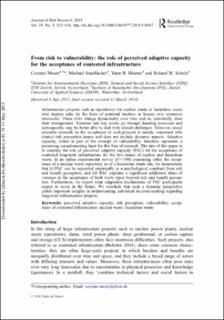Please use this identifier to cite or link to this item:
https://doi.org/10.21256/zhaw-2663Full metadata record
| DC Field | Value | Language |
|---|---|---|
| dc.contributor.author | Moser, Corinne | - |
| dc.contributor.author | Stauffacher, Michael | - |
| dc.contributor.author | Blumer, Yann B. | - |
| dc.contributor.author | Scholz, Roland W. | - |
| dc.date.accessioned | 2018-01-30T15:59:46Z | - |
| dc.date.available | 2018-01-30T15:59:46Z | - |
| dc.date.issued | 2015 | - |
| dc.identifier.issn | 1366-9877 | de_CH |
| dc.identifier.uri | https://digitalcollection.zhaw.ch/handle/11475/2310 | - |
| dc.description.abstract | Infrastructure projects such as repositories for nuclear waste or hazardous waste sites impose risks (in the form of potential burdens or losses) over extensive timescales. These risks change dynamically over time and so, potentially, does their management. Societies and key actors go through learning processes and subsequently may be better able to deal with related challenges. However, social scientific research on the acceptance of such projects is mainly concerned with (static) risk perception issues and does not include dynamic aspects. Adaptive capacity, which is part of the concept of vulnerability, therefore represents a promising complementing facet for this line of research. The aim of this paper is to examine the role of perceived adaptive capacity for the acceptance of contested long-term infrastructure for the two issues of nuclear and hazardous waste. In an online experimental survey (N = 300) examining either the acceptance of a nuclear waste repository or of a hazardous waste site we demonstrate that i) perceived adaptive capacity can be separated empirically as a psychological construct from risk and benefit perception, and ii) perceived adaptive capacity explains a significant additional share of variance in the acceptance of both waste types beyond risk and benefit perception. Furthermore, we report what adaptation mechanisms of perceived adaptive capacity participants expect to occur in the future. We conclude that such a dynamic perspective yields important insights in understanding individual decision-making regarding long-term infrastructure projects. | de_CH |
| dc.language.iso | en | de_CH |
| dc.publisher | Taylor & Francis | de_CH |
| dc.relation.ispartof | Journal of Risk Research | de_CH |
| dc.rights | Licence according to publishing contract | de_CH |
| dc.subject.ddc | 363: Umwelt- und Sicherheitsprobleme | de_CH |
| dc.title | From risk to vulnerability : the role of perceived adaptive capacity for the acceptance of contested infrastructure | de_CH |
| dc.type | Beitrag in wissenschaftlicher Zeitschrift | de_CH |
| dcterms.type | Text | de_CH |
| zhaw.departement | School of Engineering | de_CH |
| zhaw.organisationalunit | Institut für Nachhaltige Entwicklung (INE) | de_CH |
| dc.identifier.doi | 10.21256/zhaw-2663 | - |
| dc.identifier.doi | 10.1080/13669877.2014.910687 | de_CH |
| zhaw.funding.eu | No | de_CH |
| zhaw.issue | 5 | de_CH |
| zhaw.originated.zhaw | Yes | de_CH |
| zhaw.pages.end | 636 | de_CH |
| zhaw.pages.start | 622 | de_CH |
| zhaw.publication.status | publishedVersion | de_CH |
| zhaw.volume | 18 | de_CH |
| zhaw.publication.review | Peer review (Publikation) | de_CH |
| Appears in collections: | Publikationen School of Engineering | |
Files in This Item:
| File | Description | Size | Format | |
|---|---|---|---|---|
| 2015_Moser_From risk to vulnerability_Journal of Risk Research.pdf | 169.87 kB | Adobe PDF |  View/Open |
Show simple item record
Moser, C., Stauffacher, M., Blumer, Y. B., & Scholz, R. W. (2015). From risk to vulnerability : the role of perceived adaptive capacity for the acceptance of contested infrastructure. Journal of Risk Research, 18(5), 622–636. https://doi.org/10.21256/zhaw-2663
Moser, C. et al. (2015) ‘From risk to vulnerability : the role of perceived adaptive capacity for the acceptance of contested infrastructure’, Journal of Risk Research, 18(5), pp. 622–636. Available at: https://doi.org/10.21256/zhaw-2663.
C. Moser, M. Stauffacher, Y. B. Blumer, and R. W. Scholz, “From risk to vulnerability : the role of perceived adaptive capacity for the acceptance of contested infrastructure,” Journal of Risk Research, vol. 18, no. 5, pp. 622–636, 2015, doi: 10.21256/zhaw-2663.
MOSER, Corinne, Michael STAUFFACHER, Yann B. BLUMER und Roland W. SCHOLZ, 2015. From risk to vulnerability : the role of perceived adaptive capacity for the acceptance of contested infrastructure. Journal of Risk Research. 2015. Bd. 18, Nr. 5, S. 622–636. DOI 10.21256/zhaw-2663
Moser, Corinne, Michael Stauffacher, Yann B. Blumer, and Roland W. Scholz. 2015. “From Risk to Vulnerability : The Role of Perceived Adaptive Capacity for the Acceptance of Contested Infrastructure.” Journal of Risk Research 18 (5): 622–36. https://doi.org/10.21256/zhaw-2663.
Moser, Corinne, et al. “From Risk to Vulnerability : The Role of Perceived Adaptive Capacity for the Acceptance of Contested Infrastructure.” Journal of Risk Research, vol. 18, no. 5, 2015, pp. 622–36, https://doi.org/10.21256/zhaw-2663.
Items in DSpace are protected by copyright, with all rights reserved, unless otherwise indicated.